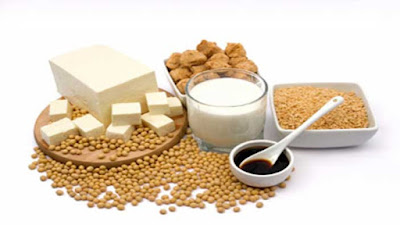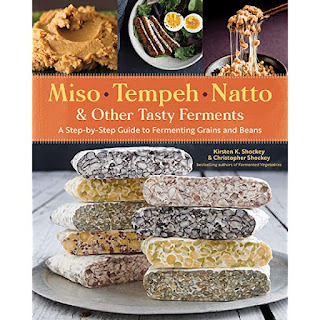It is typical for vegans and vegetarians in the Western world to rely on various soy products for their protein needs. There is little doubt that the billion-dollar soy industry has profited immensely from the anti-cholesterol, anti-meat gospel of current nutritional thought. Whereas, not so long ago, soy was an Asian food primarily used as a condiment, now a variety of processed soy products proliferate in the North American market. While the traditionally fermented soy foods of miso, tamari, tempeh and natto are definitely healthful in measured amounts, the hyper-processed soy “foods” that most vegetarians consume are not.
Non-fermented soybeans and foods made with them are high in phytic acid, an anti-nutrient that binds to minerals in the digestive tract and carries them out of the body. Vegetarians are known for their tendencies to mineral deficiencies, especially of zinc and it is the high phytate content of grain and legume based diets that is to blame. Though several traditional food preparation techniques such as soaking, sprouting, and fermenting can significantly reduce the phytate content of grains and legumes, such methods are not commonly known about or used by modern peoples, including vegetarians. This places them (and others who eat a diet rich in whole grains) at a greater risk for mineral deficiencies.
Processed soy foods are also rich in trypsin inhibitors, which hinder protein digestion. Textured vegetable protein (TVP), soy “milk” and soy protein powders, popular vegetarian meat and milk substitutes, are entirely fragmented foods made by treating soybeans with high heat and various alkaline washes to extract the beans’ fat content or to neutralise their potent enzyme inhibitors. These practices completely denature the beans’ protein content, rendering it very hard to digest. Monosodium glutamate (MSG), a popular and widespread flavouring, a known neurotoxin, is routinely added to TVP to make it taste like the various foods it imitates.
On a purely nutritional level, soybeans, like all legumes, are deficient in cysteine and methionine, vital sulphur-containing amino acids, as well as tryptophan, another essential amino acid. Furthermore, soybeans contain no vitamins A or D, required by the body to assimilate and utilise the beans’ proteins. It is probably for this reason that Asian cultures that do consume soybeans usually combine them with fish or fish broths (abundant in fat-soluble vitamins) or other fatty foods.Parents who feed their children soy-based formula should be aware of its extremely high phytoestrogen content. Some scientists have estimated a child being fed soy formula is ingesting the hormonal equivalent of five birth control pills a day. Such a high intake could have disastrous results. Soy formula also contains no cholesterol, vital for brain and nervous system development.
Though research is still ongoing, some recent studies have indicated that soy’s phytoestrogens could be causative factors in some forms of breast cancer, penile birth defects and infantile leukaemia. Regardless, soy’s phytoestrogens, or isoflavones, have been definitely shown to depress thyroid function and to cause infertility in every animal species studied so far. Clearly, modern soy products and isolated isoflavone supplements are not healthy foods for vegetarians, vegans, or anyone else, yet these are the very ones that are most consumed.

